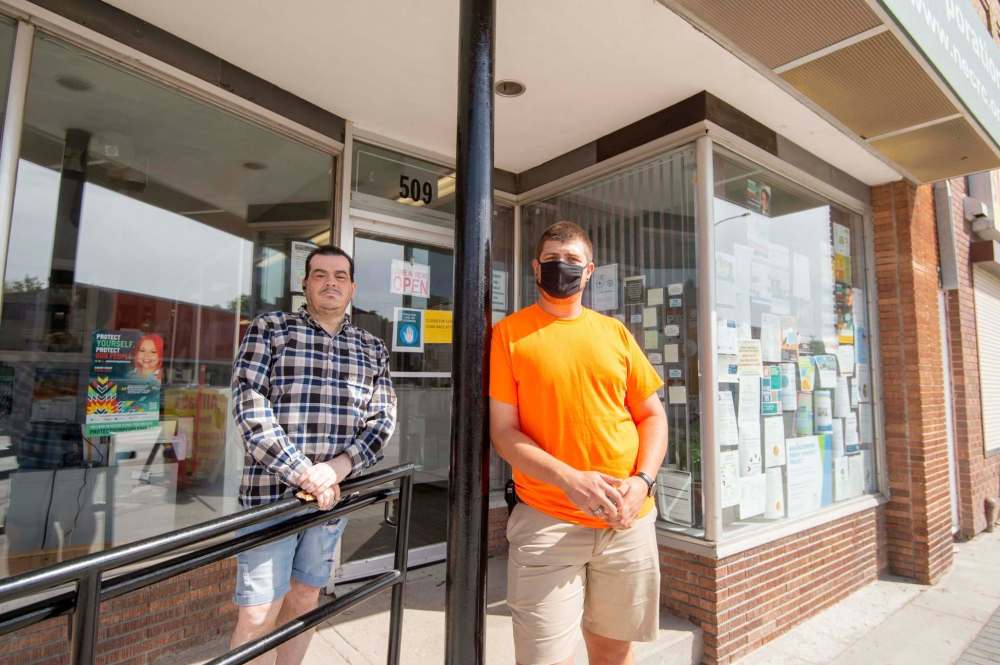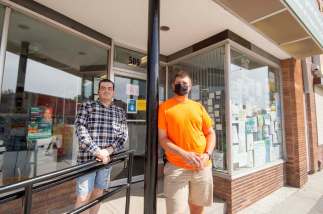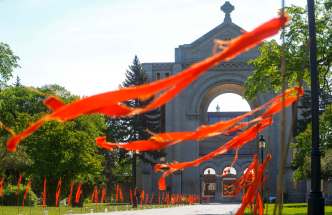Kinship before cuffs Program proposes a kinder, gentler approach to community patrolling
Read this article for free:
or
Already have an account? Log in here »
To continue reading, please subscribe:
Monthly Digital Subscription
$1 per week for 24 weeks*
- Enjoy unlimited reading on winnipegfreepress.com
- Read the E-Edition, our digital replica newspaper
- Access News Break, our award-winning app
- Play interactive puzzles
*Billed as $4.00 plus GST every four weeks. After 24 weeks, price increases to the regular rate of $19.95 plus GST every four weeks. Offer available to new and qualified returning subscribers only. Cancel any time.
Monthly Digital Subscription
$4.99/week*
- Enjoy unlimited reading on winnipegfreepress.com
- Read the E-Edition, our digital replica newspaper
- Access News Break, our award-winning app
- Play interactive puzzles
*Billed as $19.95 plus GST every four weeks. Cancel any time.
To continue reading, please subscribe:
Add Free Press access to your Brandon Sun subscription for only an additional
$1 for the first 4 weeks*
*Your next subscription payment will increase by $1.00 and you will be charged $16.99 plus GST for four weeks. After four weeks, your payment will increase to $23.99 plus GST every four weeks.
Read unlimited articles for free today:
or
Already have an account? Log in here »
Hey there, time traveller!
This article was published 13/09/2021 (1634 days ago), so information in it may no longer be current.
The Cree word wahkohtowin translates to kinship, or being related to each other.
It’s the foundation of a North End grassroots group’s new program that aims to change security enforcement and uplift everyone involved.
“We’re not training security guards,” Daniel Waycik, one of the program’s creators, said. “They’re hosts of safety, and they’re coming with tools and knowledge before anything else.”
Students will spend four months in Fearless R2W’s community safety host program. They’ll become certified security guards and learn first aid, psychological first aid, harm reduction and how to become family advocates, among other things.
The first two days in class this fall will centre around wahkohtowin.
“Things like trauma-informed care are not often available,” Waycik said. “Having somebody there who understands… can make all the difference.”

John Morrissette, a member of Fearless R2W and safety host program co-ordinator, said the group and other local organizations have spent years researching homelessness in Winnipeg and youth aging out of care.
“What a lot of young people were saying is they’d like to have a place of their own,” he said. “They have barriers like systemic racism, troubles with the systems, as in EIA, going back to school when they come out of care (and) finding stable housing.”
Applicants to community safety host should live in the North End. Preference goes to adults who face barriers, Waycik said.
“Usually, when there’s a rigorous screening process (for a program), it’s a lot of scrutinizing heavily how good the person would be in a position,” he said.
“(For) this one, we need to ensure that they will be successful candidates, not just because they’ve got all their ducks in a row, but more because they express an intent and interest in making this an important part of their life and making a difference in the community.”
Organizers are accepting four students into the first round of the Indigenous-led program. At least 17 people applied.
Institutions in the North End have offered their buildings for classroom instruction. Waycik and Morrissette were deciding between three in the first week of September.
“I personally have never worked on anything before that’s had such an overwhelmingly positive response,” Waycik said. “We’re pretty optimistic about the long-term employment for these candidates.”
Students will spend the first six weeks in class. There, they will earn certifications and learn about culture, values and beliefs that connect to trauma-informed care, harm reduction and wahkohtowin. Various Winnipeg organizations and people will conduct lessons.
“I personally have never worked on anything before that’s had such an overwhelmingly positive response.”
— Daniel Waycik
“(It’s) things people are going to deal with when they interact with a person… in a really rough moment of their day,” Waycik said. “Can you recognize that they’re having a really rough time? Are you aware of what’s going on, and do you have the tools to connect them with what they need?”
Students will be taught to recognize the resources around them, should they need to refer a person for further help.
“Something that is often missed in our incident response models are all these grassroots organizations and local resources,” Waycik said. “We can only assume… this will sort of help resolve some of the negative outcomes you see when security has to get involved.”
The program will hopefully change participants’ perspectives on people causing trouble in public places, Waycik said. Often, the one facing the worst repercussions for an incident is the person acting out.
“Nobody wakes up wanting their life to be perpetually challenging.”
The safety hosts will do work placements in libraries in the North End and St. Boniface. They’ll still attend some classes. Weekly check-ins will allow them to discuss lived experiences with instructors.
Near the end of the program, students might venture to other Winnipeg libraries, Waycik said.
“I’m hoping that they’ll be able to obtain and maintain stable employment, which would lead to stable housing for them,” Morrissette said.
The Winnipeg Foundation is providing $40,000 for the project, allowing for students to be paid while in school. The City of Winnipeg is also providing funding.
“We wanted to ensure (students) have the support they need to get through the program, especially considering they’re people who are already facing barriers,” Waycik said.
Minimum wage is not an option — only living wages will be accepted, he said.
“I do think this is (a project) that has the potential to extend well beyond the pilot phase,” Megan Tate, Winnipeg Foundation director of community grants, said.
gabrielle.piche@freepress.mb.ca

Gabrielle Piché reports on business for the Free Press. She interned at the Free Press and worked for its sister outlet, Canstar Community News, before entering the business beat in 2021. Read more about Gabrielle.
Every piece of reporting Gabrielle produces is reviewed by an editing team before it is posted online or published in print — part of the Free Press‘s tradition, since 1872, of producing reliable independent journalism. Read more about Free Press’s history and mandate, and learn how our newsroom operates.
Our newsroom depends on a growing audience of readers to power our journalism. If you are not a paid reader, please consider becoming a subscriber.
Our newsroom depends on its audience of readers to power our journalism. Thank you for your support.
History
Updated on Monday, September 13, 2021 7:28 AM CDT: Adds web headline






